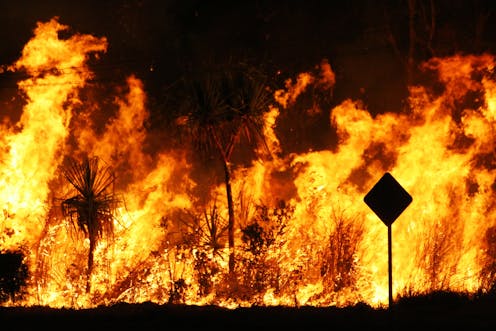Bushfires focus public attention on climate change for months, but it's different for storms and floods
- Written by Christopher Crellin, PhD Student / FNRS Aspirant, Université catholique de Louvain (UCLouvain)

As the world warms and the climate changes, people are experiencing more frequent and intense extreme weather events. Just this year, heatwaves blasted southern Europe[1], the United States and China; wildfires lit up Greece, Canada and Maui in Hawaii[2]; and winter storms froze large parts of the US[3].
Our new research[4] explores the connection between extreme weather events in Australia and public interest in climate change or global warming between 2009 and 2020. We found that bushfires, storms and floods tended to focus attention on climate change. But, crucially, the effect was short-lived and varied depending on the type of weather event.
In between extreme events, the level of interest in climate change does not appear to be increasing over time. This is despite developments in the science attributing extreme weather events to climate change, and the growing tendency of the media[5] to make these connections.
Climate activists and policymakers may be able to use these “focusing events” to raise awareness and harness support for stronger action.
Here’s how climate change is affecting Australian weather.Read more: Why are so many climate records breaking all at once?[6]
Do bushfires, storms and floods garner attention?
We collected data on extreme weather events from the Australian Disaster Resilience Knowledge Hub[7], which is managed by the Australian Institute for Disaster Resilience[8].
We concentrated on the bushfires, storms and floods that occurred in Australia between 2008 and 2020.
Using the Google Trends[9] intensity index to measure people’s attention, we analysed the use of the search terms “climate change” and “global warming” in the months following each event.
We found more searches for climate change and global warming during the month of, and immediately after, an extreme weather event.
However, such heightened attention was rather short-lived. And there were differences in the intensity and duration of this attention, depending on the type of weather event.
Read more: Yes, climate change is bringing bushfires more often. But some ecosystems in Australia are suffering the most[10]
Major bushfires generated intense and sustained interest. During the month of a major bushfire, attention to climate change increased. The level of attention was higher still one month after the bushfire, and remained elevated for about four months.
Extreme storms prompted the most intense search activity but the effect did not last long. Attention to climate change dissipated one month after the storm.
Major flooding events did not appear to generate significant attention to climate change. This suggests Australians are more likely to think of climate change in terms of its tendency to cause hotter, drier weather, and less inclined to appreciate how it can cause wetter weather as well.
Although there is a growing trend within the media to underscore the connection between extreme weather events and climate change over the past decade, this does not seem to be generating more climate attention. For instance, while the Black Summer bushfires drove an exceptional uptick in climate attention, the same occurred during the Black Saturday bushfires a decade earlier.
Read more: Here's why climate change isn't always to blame for extreme rainfall[12]
It’s worth paying attention to attention
Australia has been described as “the petri-dish of climate change[13]”. Our continent is prone to a variety of severe climate impacts such as droughts, floods, fires, storms and coral bleaching, and yet we’re also one of the world’s worst climate laggards[14].
Understanding how Australians respond to extreme weather events could serve as a much-needed catalyst for national climate progress.
But increased climate ambition is not guaranteed to flow from these destructive events. That’s because climate attention is quite short-lived, and not always as intense as one might hope.
We believe our research can help activists and policymakers capitalise on the increased intensity and duration of public interest in climate change following extreme events and translate that attention into a sustained appetite for climate policy action.
Read more: Fear and Wonder podcast: how scientists attribute extreme weather events to climate change[15]
References
- ^ heatwaves blasted southern Europe (theconversation.com)
- ^ Maui in Hawaii (theconversation.com)
- ^ winter storms froze large parts of the US (www.bbc.com)
- ^ new research (link.springer.com)
- ^ tendency of the media (www.tandfonline.com)
- ^ Why are so many climate records breaking all at once? (theconversation.com)
- ^ Australian Disaster Resilience Knowledge Hub (knowledge.aidr.org.au)
- ^ Australian Institute for Disaster Resilience (www.aidr.org.au)
- ^ Google Trends (trends.google.com)
- ^ Yes, climate change is bringing bushfires more often. But some ecosystems in Australia are suffering the most (theconversation.com)
- ^ Christopher Crellin (link.springer.com)
- ^ Here's why climate change isn't always to blame for extreme rainfall (theconversation.com)
- ^ the petri-dish of climate change (www.rollingstone.com)
- ^ climate laggards (www.tandfonline.com)
- ^ Fear and Wonder podcast: how scientists attribute extreme weather events to climate change (theconversation.com)

















